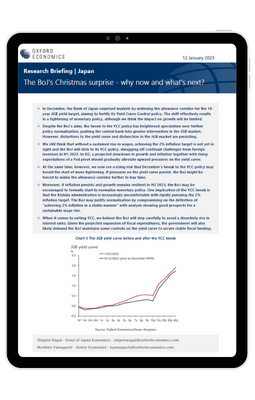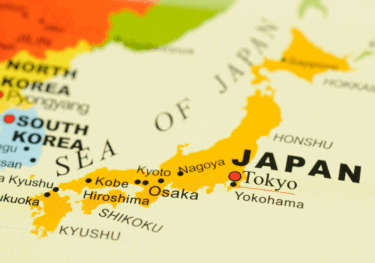The BoJ’s Christmas surprise – why now and what’s next?
In December, the Bank of Japan surprised markets by widening the allowance corridor for the 10-year JGB yield target, aiming to fortify its Yield Curve Control policy. The shift effectively results in a tightening of monetary policy, although we think the impact on growth will be limited.

What you will learn:
- Despite the BoJ’s aims, the tweak to the YCC policy has heightened speculation over further policy normalisation, pushing the central bank into greater intervention in the JGB market. However, distortions to the yield curve and dysfunction in the JGB market are persisting.
- We still think that without a sustained rise in wages, achieving the 2% inflation target is not yet in sight and the BoJ will stick to its YCC policy, shrugging off continual challenges from foreign investors in H1 2023. In H2, a projected slowdown in growth and inflation together with rising expectations of a Fed pivot should gradually alleviate upward pressures on the yield curve.
- At the same time, however, we now see a rising risk that December’s tweak to the YCC policy may herald the start of more tightening. If pressures on the yield curve persist, the BoJ might be forced to widen the allowance corridor further to buy time.
Tags:
Related Resouces

Post
Tariffs and Politics Leave the BoJ Powerless in Japan
The Bank of Japan kept its policy rate at 0.5% at its July meeting. We continue to think the BoJ will exercise caution on rate hikes despite still-high inflation and a recent trade deal with the US.
Find Out More
Post
US-Japan Trade Deal Fails to Shift Japan’s Growth Outlook
We estimate that the US's effective tariff rate on Japanese products is around 17%, in line with our baseline assumption. Lower tariffs on autos are a positive, given the sector's significant contribution to the economy and its broad domestic supporting base
Find Out More
Post
Japan’s Rising Political Instability Will Undermine Fiscal Discipline
The ruling Liberal Democratic party (LDP) and its partner Komeito lost their majority in Japan's upper house elections on July 20. Although Prime Minister Shigeru Ishiba will likely stay to avoid political gridlock, especially to complete tariff negotiations with the US, the political situation has become fluid and could lead to a leadership change or the reshuffling of the coalition.
Find Out More